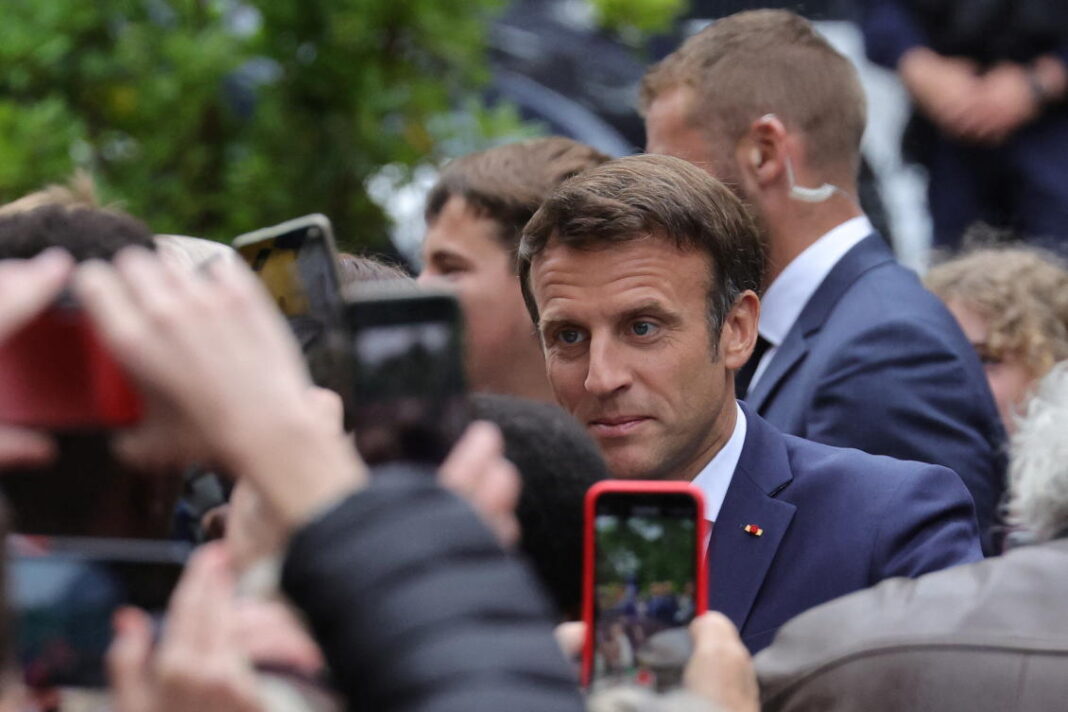PARIS: French President Emmanuel Macron’s centrist alliance was projected to lose its majority despite getting the most seats in the final round of the parliamentary election Sunday, while the far-right National Rally appeared to have made big gains.
The projections, which are based on partial results, show that Macron’s candidates would win between 200 and 250 seats — much less than the 289 required to have a straight majority at the National Assembly, France’s most powerful house of parliament.
The situation, which is unusual in France, is expected to make Macron’s political maneuvering difficult if the projections are borne out.
A new coalition — made up of the hard left, the Socialists and the Greens — is projected to become the main opposition force with about 150 to 200 seats.
National Rally is projected to register a huge surge with potentially more than 80 seats, up from eight before. Polling was held nationwide to select the 577 members of the National Assembly.
The strong performance of both the National Rally and the leftist coalition, led by hard-left leader Jean-Luc Melenchon, is expected to make it harder for Macron to implement the agenda he was reelected on in May, including tax cuts and raising France’s retirement age from 62 to 65.
The National Rally’s leader, Marine Le Pen, who lost to Macron in the presidential election in May, was reelected in her stronghold of H?nin-Beaumont, in northern France.
“The Macron adventure has reached its end,” Le Pen said. The group of National Rally lawmakers “will be by far the biggest of the history of our political family.”
Acting National Rally president Jordan Bardella compared his party’s showing to a “tsunami.” “Tonight’s message is that the French people made from Emmanuel Macron a minority president,” he said on TF1 television.
“It’s the electoral failure of Macronism,” M?lenchon said.
Macron’s government will still have the ability to rule, but only by bargaining with legislators. The centrists could try to negotiate on a case by case basis with lawmakers from the center-left and from the conservative party — with the goal of preventing opposition lawmakers from being numerous enough to reject the proposed measures.
The government could also occasionally use a special measure provided by the French Constitution to adopt a law without a vote.
Government spokesperson Olivia Gr?goire said on France 2 television that “we’ve known better evenings.”
“This is a disappointing top position, but still a top position,” she said.
“We are holding out a helping hand to all those who are OK to make that country move forward,” she said, notably referring to the Republicans party, which is expected to have less seats than the far right.
Interior Minister G?rald Darmanin, who himself won a seat in his district in northern France, stressed that M?lenchon “lost his bet” to win the elections. Prime Minister Elisabeth Borne also won a seat in western France.
A similar situation happened in 1988 under Socialist President Francois Mitterrand, who then had to seek support from the Communists or the centrists to pass laws.
These parliamentary elections have once again largely been defined by voter apathy — with over half the electorate staying home.
Audrey Paillet, 19, who cast her ballot in Boussy-Saint-Antoine in southeastern Paris, was saddened that so few people turned out.
“Some people have fought to vote. It is too bad that most of the young people don’t do that,” she said.
Macron made a powerfully choreographed plea to voters earlier this week from the tarmac ahead of a trip to Romania and Ukraine, warning that an inconclusive election, or hung parliament, would put the nation in danger.
“In these troubled times, the choice you’ll make this Sunday is more crucial than ever,” he said Tuesday, with the presidential plane waiting starkly in the background ahead of a visit to French troops stationed near Ukraine. “Nothing would be worse than adding French disorder to the world’s disorder,” he said.
Some voters agreed, and argued against choosing candidates on the political extremes who have been gaining popularity. Others argued that the French system, which grants broad power to the president, should give more voice to the multi-faceted parliament and function with more checks on the presidential Elysee palace and its occupant.
“I’m not afraid to have a National Assembly that’s more split up among different parties. I’m hoping for a regime that’s more parliamentarian and less presidential, like you can have in other countries,” said Simon Nouis, an engineer voting in southern Paris.
“The disappointment was clear on the night of the first round for the presidential party leaders,” said Martin Quencez, political analyst at The German Marshall Fund of the United States.
Macron’s failure to get a majority could have ramifications across Europe. Analysts predict that the French leader will have to spend the rest of his term focusing more on his domestic agenda rather than his foreign policy. It could spell the end of President Macron the continental statesman.
Macron alliance projected to lose parliamentary majority




